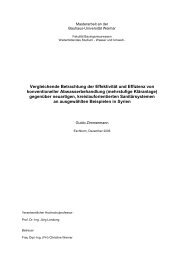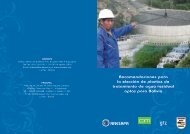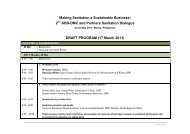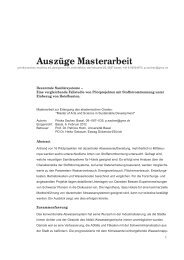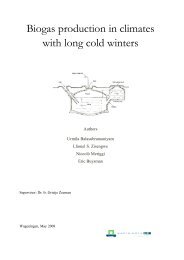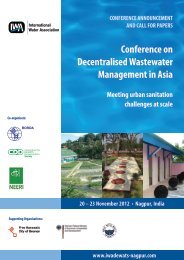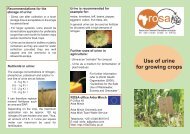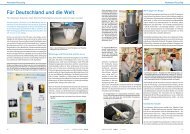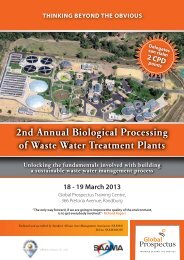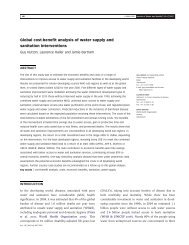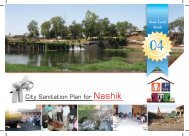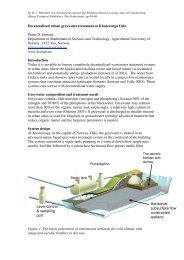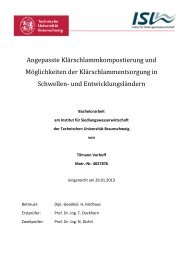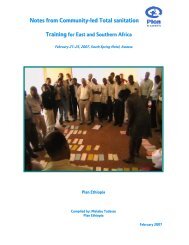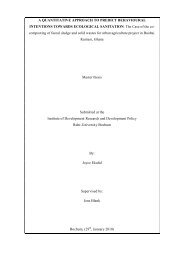MASTER'S THESIS - SuSanA
MASTER'S THESIS - SuSanA
MASTER'S THESIS - SuSanA
Create successful ePaper yourself
Turn your PDF publications into a flip-book with our unique Google optimized e-Paper software.
7 Presentation of the institutional framework<br />
Additionally, it is planned to set up a list of criteria that can change the sequence of the action if necessary<br />
and reasonable. This shall help the government to have guiding principles and to stay flexible if necessary.<br />
This Masterplan shall help to organise the water sector in a more structured way and to make decision for<br />
investment more transparent. The Masterplan will consider whole Albania and not only some regions what<br />
makes it a tool for a comprehensive planning. It directs donor money to the most urgent needed actions<br />
and shall help to make the sector more sustainable. Overlapping action can be avoided.<br />
7.2 How communes can start a project<br />
This sub-chapter shall show on two examples how communes can implement small size wastewater<br />
projects. Unfortunately, until now not many projects were done in this field in Albania. The one example<br />
shows the implementation process of a constructed wetland plant for wastewater treatment at the SOS<br />
children's village in Tirana, funded by GIZ and GDWSS. The other example shows the implementation<br />
process of the ADF water supply project in rural areas of Northern Albania, financed by KfW. As no<br />
wastewater project is done in Albanian villages until now, the process shall help to learn how to proceed for<br />
wastewater projects and what stakeholders have to be included in the process.<br />
7.2.1 Example of implementing a CW at SOS children’s village<br />
The constructed wetland plant at the SOS children's village in Sauk, Tirana, is a successful pilot plant for<br />
small size wastewater tretment plants in Albania. But as the SOS children's village can be seen as one facility<br />
and is not comparable with villages in rural Albania, processes and learnings from the implementation of<br />
that plant can not be adopted completely for projects in rural Albanian areas. But still, the project can give<br />
some insights into necessary process steps and success factors and will therefore be presented at this point.<br />
7.2.1.1 Process of implementation<br />
The following part describes the process from the idea to the implementation of the constructed wetland at<br />
the SOS children’s village in Sauk, a suburb of Tirana. The description shall show how stakeholders have<br />
been successfully involved in the planning process and what steps had to be taken by the GTZ. The<br />
description is mainly based on two interviews with Enkelejda Gjinali, who was project coordinator for GIZ<br />
Albania for seven years and is lecturer at the Politechnical University of Tirana dealing with wastewater and<br />
industrial wastewater plants for 17 years, and Andreas Kanzler, who was at this time the senior specialist<br />
planner for Albania in the GIZ office in Eschborn, Germany. Some further information about contracts taken<br />
from documents or gained while talking with Andi Papaproko, Assistant for the “Water Sector Reform”<br />
programme, are marked in the text with the source.<br />
The process from the idea to the implementation of the constructed wetland at the SOS children’s village<br />
was taking a long time. Andreas Kanzler had a big interest in the wastewater topic of Albania. He went to<br />
Albania three times and started the discussion about implementation of a constructed wetland. His original<br />
idea was to implement a technology that allows the reuse of treated wastewater. Parallel to this, Enkelejda<br />
Gjinali proposed the Terms of Reference (TOR) for the implementation of a low cost technology in Albania<br />
to the GIZ in the beginning of 2008 (January – April 2008). The aim was to have a case study and to bring a<br />
new technology for wastewater treatment to Albania.<br />
As Albania has mostly sufficient water resources and experiences no big problems concerning the<br />
uncontrolled discharge of wastewater, Andreas Kanzler experienced a lack of awareness for the<br />
environmental and health issues related to this when he visited the country. To change the situation, he<br />
hired the engineer Martin Wafler from the Austrian consultant company seecon GmbH to make a Baseline<br />
Study about the wastewater situation in Albania and to propose some suitable technology for the<br />
wastewater treatment. The goal was to get a basic idea of the situation and suggestions for improvement<br />
86



